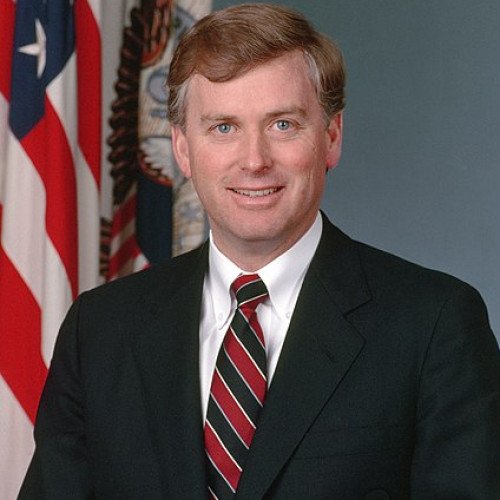Barry Goldwater VS Dan Quayle

Barry Goldwater
Barry Morris Goldwater (January 2, 1909 – May 29, 1998) was an American politician, businessman, and author who was a five-term Senator from Arizona (1953–1965, 1969–1987) and the Republican Party nominee for president of the United States in 1964. Despite his loss of the 1964 presidential election in a landslide, Goldwater is the politician most often credited with having sparked the resurgence of the American conservative political movement in the 1960s. He also had a substantial impact on the libertarian movement.Goldwater rejected the legacy of the New Deal and, along with the conservative coalition, fought against the New Deal coalition. A member of the NAACP and active supporter of desegregation in Phoenix, Goldwater voted in favor of the Civil Rights Act of 1957 and the 24th Amendment to the U.S. Constitution, but opposed the Civil Rights Act of 1964, believing it to be an overreach by the federal government—a decision that considerably anguished him. In 1964, Goldwater mobilized a large conservative constituency to win the hard-fought Republican presidential primaries. Although raised as an Episcopalian, Goldwater was the first candidate of ethnically Jewish heritage to be nominated for President by a major American party (his father was Jewish). Goldwater's platform ultimately failed to gain the support of the electorate and he lost the 1964 presidential election to incumbent Democrat Lyndon B. Johnson by one of the largest margins in history. Goldwater returned to the Senate in 1969 and specialized in defense and foreign policy. As an elder statesman of the party, Goldwater successfully urged President Richard Nixon to resign in 1974 when evidence of a cover-up in the Watergate scandal became overwhelming and impeachment was imminent. Goldwater narrowly won re-election in 1980 for what would be his final and most influential term in the senate. In 1986, Goldwater oversaw passage of the Goldwater–Nichols Act, arguably his most significant legislative achievement, which strengthened civilian authority in the Department of Defense. The following year, he retired from the Senate and was succeeded by John McCain, who praised his predecessor as the man who "transformed the Republican Party from an Eastern elitist organization to the breeding ground for the election of Ronald Reagan". Goldwater strongly supported the 1980 presidential campaign of Reagan, who had become the standard-bearer of the conservative movement after his "A Time for Choosing" speech. Reagan reflected many of the principles of Goldwater's earlier run in his campaign. The Washington Post columnist George Will took note of this, writing: "We [...] who voted for him in 1964 believe he won, it just took 16 years to count the votes". Goldwater's views grew increasingly libertarian as he neared the end of his career. After leaving the Senate, Goldwater's views cemented as libertarian. He criticized the "moneymaking ventures by fellows like Pat Robertson and others [in the Republican Party] who are trying to... make a religious organization out of it." He lobbied for homosexuals to be able to serve openly in the military, opposed the Clinton administration's plan for health care reform, supported abortion rights, and the legalization of medicinal marijuana.
Statistics for this Xoptio

Dan Quayle
James Danforth Quayle (; born February 4, 1947) is an American politician and lawyer who served as the 44th vice president of the United States from 1989 to 1993. Quayle was also a U.S. representative from 1977 to 1981 and a U.S. senator from 1981 to 1989 from the state of Indiana. A native of Indianapolis, Indiana, Quayle spent most of his childhood in Paradise Valley, a suburb of Phoenix, Arizona. He married Marilyn Tucker in 1972 and obtained his J.D. degree from the Indiana University Robert H. McKinney School of Law in 1974. Quayle practiced law in Huntington, Indiana, with his wife before his election to the United States House of Representatives in 1976. In 1980 Quayle was elected to the U.S. Senate. In 1988, Vice President and Republican presidential nominee George H. W. Bush chose Quayle as his running mate. Quayle's vice presidential debate against Democratic candidate Lloyd Bentsen was notable for the "Senator, you're no Jack Kennedy" incident. The Bush/Quayle ticket won the 1988 election over the Democratic ticket of Michael Dukakis and Bentsen, and Quayle became vice president in January 1989. As vice president, he made official visits to 47 countries and was appointed chairman of the National Space Council. He secured re-nomination for vice president in 1992, but Democrat Bill Clinton and his running mate, Al Gore, defeated the Bush/Quayle ticket. In 1994 Quayle published his memoir, Standing Firm. He declined to run for President in 1996 because he was suffering from phlebitis. Quayle sought the Republican presidential nomination in 2000 but later withdrew from the campaign and supported the eventual winner, George W. Bush. He joined Cerberus Capital Management, a private equity firm, in 1999.